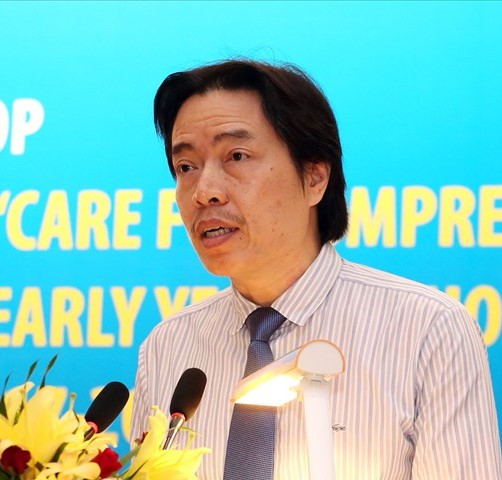.jfif) Opinion
Opinion


|
| Đặng Hoa Nam, Director of the Ministry of Labour, Invalids and Social Affairs’ Department of Child Affairs. Photo laodong.vn |
Đặng Hoa Nam, Director of the Ministry of Labour, Invalids and Social Affairs’ Department of Child Affairs, talks to Nhân dân (The People) newspaper about measures to prevent child labour.
What do you think about Việt Nam’s legal framework on child labour?
I think awareness of children’s rights has improved but awareness of child labour needs to be increased, particularly among authorities at all levels, State management agencies and businesses.
Most child workers are often found in informal sectors. Many export products and sectors such as seafood and farming come from informal sectors so there is a high risk for child workers to be used in the field of agriculture.
It is therefore necessary to adjust the legal framework, including amending the revised Labour Code, to have full regulations on the use of child labour as well as better manage child labour, particularly in informal sectors.
The draft revision of the Labour Code, which has been submitted to the National Assembly for approval, has a chapter regulating workers under 18 years old. The regulation provides clear requirements on the age of children to be allowed to work.
Also, the Labour Code needs to have regulations on child labour in informal sectors to fall in line with conventions that Việt Nam already ratified. That is a key point.
Which measures should the Government adopt to prevent child labour?
The Government developed a master plan on preventing child labour in 2012, with a focus on informal sectors, targeting craft villages and household businesses. The plan promotes information dissemination to raise public awareness, particularly of households, children and employers.
It is necessary to increase inspections and examinations to promptly detect and handle violations relating to child labour.
Việt Nam is striving to become a pioneer in implementing the 2030 Sustainable Development Programme, which covers the prevention and reduction of child labour. This is an active commitment by the Government but the responsibility in implementation is partly held by authorities of localities. The awareness of local authorities and People’s Committees at all levels is very important, particularly in the context that Việt Nam is joining advanced trade agreements. This means it has to attach great importance to standards on child labour.
You have mentioned the need to increase inspections. Are the current punishments tough enough?
Việt Nam has adequate punishments for these violations, including both administrative and criminal measures. The 2015 Penal Code (which was amended in 2017) had punishments for the use of child workers. However, in order to detect violations on child labour, inspectors and law enforcement need to be more active.
It is also necessary to help child workers get vocational training to help them change jobs. This is an approach of a country with many poor households. Of course, it still needs to work to gradually put an end to child labour but it takes time. The law does not ban children from working but the work must match their age.
What do you think are the key measures in preventing child labour?
The key and long-term solution is to raise awareness of children, parents and businesses. It is crucial to help them understand that the use of child labour in economic activities cannot be compared with letting children go to school or get vocational training.
Information dissemination therefore needs to be done regularly.
A good sign is that many cases of child abuse, including child labour violations, were detected and denounced by the general public. However, prevention still plays an important role. We should not let violations happen and then find solutions to deal with them.
It is also necessary to have more policies to help children get access to health, education and cultural policies. The 2016 Law on Children states that children are given priority.
Children should be the ones who benefit the most from socio-economic achievements.
Việt Nam has signed new trade agreements, including the Comprehensive and Progressive Agreement for Trans-Pacific Partnership and the European Union-Việt Nam Free Trade Agreement, which have specific regulations banning the use of child workers. Will this put pressure on businesses?
I think it is positive pressure. Once Việt Nam joins such advanced playgrounds, it must have the best preparations and avoid possible risks. Countries have bilateral and multilateral mechanisms to detect whether a product and a sector used child labour or not.
Businesses have big responsibilities in preventing and reducing child labour. If businesses fail to abide by such regulations of these trade agreements, it will directly affect the market share and prestige of themselves and of the country.
We need to abide by the game’s rules. I want to stress that responsibility is on three sides – State management agencies, businesses and consumers – in order to create a strong network to protect children and prevent child labour. VNS




